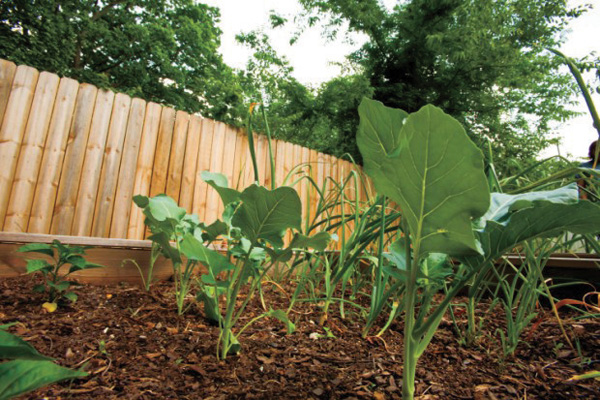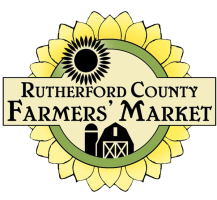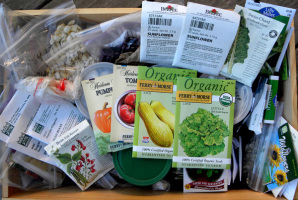
And we’re off! Another growing season has begun.
The produce from our fruits and vegetables is a direct result of their growing conditions. It is possible to improve the soil in new and established gardens. It is a process that takes time and is unique to each garden based on its needs, which can be determined by a soil test. The addition of composted material, manure, lime, sand, peat, perlite, vermiculite, or potting soil mixtures are soil improvements.
The objective is to supply the plant with its ideal growing situation to produce the best harvest or biggest blooms available to its species. Soil properties to evaluate are rooting depth available, drainage, soil texture and structure, water-holding capacity and lack of rocks. So, do a little research and know what constitutes the ideal growing environment for the plants you have chosen. Be aware of sun/shade requirements, watering and moisture levels, needed nutrients and pH requirements of the plants that you have selected to grow.
Consider growing your plants from seed. You will have a wider assortment for your selection. One huge advantage in starting your own plants from seed is control. You reduce the chances of introducing harmful insects or diseases into the garden if you start your own plants. Plus, you know if you spray any chemical on your seedlings.
Don’t assume that purchased flats or six-packs of seedlings have not already undergone a chemical induction. Plants that you can purchase may be treated with neonictinoids, a chemical that is suspect in killing pollinators. The original purpose of the neonictinoids creation is a dream come true: to systemically kill sap-feeding insects and control against certain beetles, fleas, certain wood-boring pests, flies, cockroaches and others. Originally thought to have no effect on beneficial insects, neonictinoids are now being studied for interfering with a pollinator’s ability to navigate between the hive and the nectar, thus killing the hive.
The chemical is suspect but studies are inconclusive. The manufacturers of the products with neonictinoids recommend minimizing impact on the environment, including the pollinators, by following the label directions carefully, restricting neonicotine applications to the soil, or during times when bees are not foraging (in the evening), and treating only those individual plants which need treatment for a known pest infestation rather than a universal application of the product to all vegetables. There is no labeling required on plants being sold that have been treated with this chemical.
Try to start your summer vegetables within three to six weeks prior to transplanting. Frosts are over by April 15 (tax day). Summer vegetables should be in the ground by Mother’s Day.
If you choose to start your own veggies, start with clean pots. A 1:10 mixture of bleach and water will sterilize them. You want to use a starter medium as well, not soil from the garden. Seed-starting mixtures are usually composed of vermiculite and peat. You can also make your own by mixing one-third part sand, one-third part peat moss and one-third loamy soil, then heating it in an oven for 30 minutes at 180 degrees to sterilize it. Cool before using.
Fill the pots or flats with a potting mix, and water the mix before sowing seeds. The potting mix will settle down into the containers. Add more potting mix and water again, until the containers or cells are nearly full. Try to sow within six weeks of transplanting into their outdoor location. Sow one seed per pot or cell. There is no fertilizer in seed starting mixtures, so water with fertilizer mixed at half strength.
You can create your own fertilizer through your own worms’ efforts. Vermicomposting is a process of using your worms’ discharge as a natural fertilizer for your plants.
The difference between chemical and organic fertilizers is the way in which they are made; the concentration and availability of the nutrients. Organic fertilizers are made directly from animal or plant products and are mineralized by microorganisms into an inorganic form which can then be used by the plant. It is a longer process but does increase the organic matter in the soil. Lime and wood ashes do increase the pH (alkaline) and materials for lowering soil pH (acidic) include sulfur, peat moss, and cottonseed meal.
Chemical fertilizers with 10-10-10 state that a balanced rating of the three elements—nitrogen, phosphate and potash—are rated according to the percentages of primary nutrients of Nitrogen (N), phosphorous (P) and potassium (K) that are contained within. The release of these elements to the plant is pH sensitive. Ideal pH is 6.5–7 as ions of all elements are available in this neutral pH.
Nitrogen is for green and growth. Phosphate is for fruiting and flowering, while the potassium element is for healthy roots. You want to follow your soil test recommendations or at the least, the label instructions on how much to use.
Fertilizer, especially phosphorous, is an example of where more is not better. Over-fertilizing can create environmental issues, harm the plants and is a financial waste.
To produce vegetables, pollinators are needed in our yards and gardens. Beetles, bees, ants, wasps, butterflies and moths contribute to pollination. Their continual access to the plants provides successful pollination which results in healthy fruit and vegetables and fertile seeds for next year’s crop. There are plants that do attract pollinators. Try to plant native species. Ladybugs are our friends; they eat harmful insects, including those sneaky aphids.
Remember this is the time of year when you need to buy seeds for the planting cycles throughout this growing season. Store any extra seed in the refrigerator as it is a cool, dry place.
There are some fun and informative events to attend this upcoming month:
Adventures in Agriculture Festival
This year’s Adventure in Agriculture will be held Saturday, April 11 from 10 a.m.–2 p.m. at the Lane Agri-Park on John Rice Blvd. in Murfreesboro. It is a free, family friendly event with hands-on activities, livestock, trolley rides, horse events and many opportunities for fun and learning for both adults and children.
 Farmers’ Market Vendor Training
Farmers’ Market Vendor Training
The Rutherford County Farmers’ Market is a producer-only market. so if you are interested in selling at the Rutherford County Farmer’s Market you need to apply. There is an all-day Spring Vendor Meeting on April 15 from 9 a.m.–4 p.m. at the Lane Agri-Park Community Center. This will be a full day, offering lots of tools and resources to grow your business and make your experience at the RC Farmers’ Market an enjoyable one.
Topics will include farm record-keeping, plasticulture irrigation, GAP funding opportunities, using the Southeastern Vegetable Crop Handbook, FMNP-WIC voucher training, farm to school opportunities, marketing and season booth drawings.
Vendor application and information can be downloaded from https://extension.tennessee.edu/Rutherford/Pages/Farmers-Market.aspx. Pre-registration is required. Please call (615) 898-7710 or email jbecker8@utk.edu to sign up.
Plant and Seed Swap
The Master Gardeners of Rutherford County are organizing the free, family-friendly community plant and seed swap on Saturday, May 2 from 9 a.m.–2 p.m. This event is open to the public and will also be held at the Lane Agri-Park Community Center (315 John Rice Blvd).
 The rules for participation are simple: for each one you bring, you take one. You will be checked in and receive a ticket with the number of swaps that you have brought. Everything must have a name and instructions. You choose what you want to bring home and will be checked out to verify the count. If you don’t have plants, bring a canned-food item as a donation to alleviate hunger in our community; 1 can = 1 plant. You can bring your potted plants, seedlings, seeds, cuttings, bulbs and houseplants for this fun and informative event. You’re asked not to bring plants that are taking over your yard!
The rules for participation are simple: for each one you bring, you take one. You will be checked in and receive a ticket with the number of swaps that you have brought. Everything must have a name and instructions. You choose what you want to bring home and will be checked out to verify the count. If you don’t have plants, bring a canned-food item as a donation to alleviate hunger in our community; 1 can = 1 plant. You can bring your potted plants, seedlings, seeds, cuttings, bulbs and houseplants for this fun and informative event. You’re asked not to bring plants that are taking over your yard!
There will be a silent auction, door prizes, an Ask a Master Gardener table, educational exhibits and speakers throughout the day.
Hummingbirds will be the topic at 10 a.m., presented by John Anderson from Anderson Pools, Spas and Wild Bird Station.
Monarchs, Migration and Milkweed will be presented at 10:45 a.m. by Linell from Monarch Meadows.
At 11:30, David Adams from National Park Service will speak on invasive plants (plants that take over).
The last speaker will be Keith Elrod from the Rutherford County Beekeeping Association, who will speak on Beginner Beekeeping at 12:15 p.m.
Farmers’ Market Opens
May 8 is opening day at the Farmers’ Market located at Lane Agri-Park Community Center. The market is open from 7 a.m.–noon on Tuesdays and Fridays. It is a producer-only market.
Educational classes are held on market days and are open to everyone, free of charge. Registration is not needed. Classes start at 9 a.m. and last approximately one hour. View the class schedule here: https://extension.tennessee.edu/Rutherford/Pages/Farmers-Market.aspx













